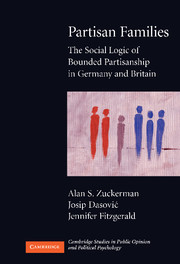Book contents
- Frontmatter
- Contents
- List of Figures and Tables
- Acknowledgments
- Preface: The Theoretical Approach, the Question, and the Data
- 1 The Social Logic of Partisanship: A Theoretical Excursion
- 2 Bounded Partisanship in Germany and Britain
- 3 A Multivariate Analysis of Partisan Support, Preference, and Constancy
- 4 Bounded Partisanship in Intimate Social Units: Husbands, Wives, and Domestic Partners
- 5 Bounded Partisanship in Intimate Social Units: Parents and Children
- 6 Partisan Constancy and Partisan Families: Turnout and Vote Choice in Recent British Elections
- Conclusion: Family Ties, Bounded Partisanship, and Party Politics in Established Democracies
- Appendix
- References
- Index
- Books in the Series
6 - Partisan Constancy and Partisan Families: Turnout and Vote Choice in Recent British Elections
Published online by Cambridge University Press: 05 June 2012
- Frontmatter
- Contents
- List of Figures and Tables
- Acknowledgments
- Preface: The Theoretical Approach, the Question, and the Data
- 1 The Social Logic of Partisanship: A Theoretical Excursion
- 2 Bounded Partisanship in Germany and Britain
- 3 A Multivariate Analysis of Partisan Support, Preference, and Constancy
- 4 Bounded Partisanship in Intimate Social Units: Husbands, Wives, and Domestic Partners
- 5 Bounded Partisanship in Intimate Social Units: Parents and Children
- 6 Partisan Constancy and Partisan Families: Turnout and Vote Choice in Recent British Elections
- Conclusion: Family Ties, Bounded Partisanship, and Party Politics in Established Democracies
- Appendix
- References
- Index
- Books in the Series
Summary
Man may not be a political animal, but he is certainly a social animal. Voters do respond to the cues of commentators and campaigners, but only when they can match those cues up with the buzz of their own social group. Individual voters are not rational calculators of self-interest (nobody truly is), and may not be very consistent users of heuristic shortcuts, either. But they are not just random particles bouncing off the walls of the voting booths. Voters go into the booth carrying the imprint of the hopes and fears, the prejudices and assumptions of their family, their friends, and their neighbors. For most people, voting may be more meaningful and more understandable as a social act than as a political act.
Louis Menand, The New Yorker, August 30, 2004, 96We have developed a social logic of partisanship: the partisan choices of heads of households, at one point in time and over time, are affected by the partisan preferences of others in the family, as well as other more distant and abstract social locations; the level of partisan similarity between husbands and wives and parents and children reflects their shared social locations, and the bounded nature of partisanship; and the length of marriage influences partisan concurrence in couples. Spouses influence each other. There are as well reciprocal effects among the partisan choices of household partners and parents and children.
- Type
- Chapter
- Information
- Partisan FamiliesThe Social Logic of Bounded Partisanship in Germany and Britain, pp. 123 - 141Publisher: Cambridge University PressPrint publication year: 2007
- 1
- Cited by



